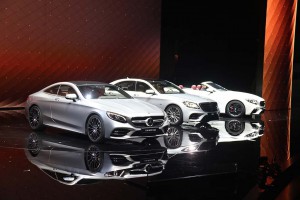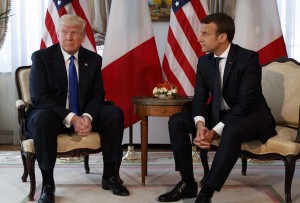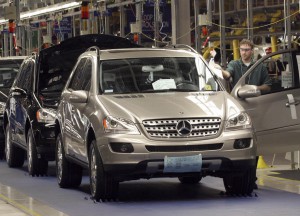
An endangered species? Trump's tariffs would drive up prices for imports like the Mercedes S-Class. But Trump may try to ban them entirely.
President Donald Trump apparently wants to force German luxury car manufacturers out of the United States, reportedly telling French President Emmanuel Macron during a recent state visit that he wants to get to the point where there will be no Mercedes-Benz models driving down New York’s upscale Fifth Avenue.
While there has been no White House verification of the report that first ran in the German WirtschaftsWoche, the business magazine – like other media outlets picking up on the story – cited several U.S. and European diplomats.
The news comes just a week after Trump ordered U.S. Commerce Secretary Wilbur Ross to investigate whether automotive imports constitute a threat to the country’s national security. Such a finding would allow the president to bypass Congress under Section 232 of the Trade Expansion Act of 1962 and directly impose new tariffs which, White House sources have indicated, could jump to 25% compared to the 2.5% duties imposed on most auto imports today.
Industry experts warn that such a move could all seriously damage automotive brands dependent upon export to the U.S., the world’s second-largest luxury car market. That move alone could be particularly harmful to high-line German marques, such as Mercedes, which could see the price of products like the S-Class jump by $25,000 or more. But the impact of new tariffs could be even harsher on mainstream brands, like Volkswagen, that compete in highly price-sensitive market segments.
(Makers claim Trump investigation of auto imports ill-conceived. Click Here for the story.)

President Donald Trump, left, reportedly told French President Emmanuel Macron that he wants to rid the U.S. of German cars.
Overall, the price tag from a new, 25% tariff could come to 4.5 billion Euros for German luxury car manufacturers alone – assuming sales of imported models won’t collapse – according to a new report by Evercore ISI.
Since launching his presidential bid, Trump has put an emphasis on trade and U.S. manufacturing. He has often focused on the auto industry, at one point threatening to enact a “substantial border tax” aimed at Ford Motor Co. for a planned move of small car production to Mexico. General Motors and Toyota also were targets of Trump tweets.
While the president frequently became worked up over increasing imports of Mexican-made vehicles, his threat voiced to Macron would, if accurate, mark the first time Trump has specifically targeted automakers from a single country.
The apparent escalation “makes no rational sense,” Joe Phillippi, head of AutoTrends Consulting, told TheDetroitBureau.com.
Meanwhile, German Finance Minister Olaf Scholz told the Reuters news service the EU needs to make a “clear and strong and smart” response to any new U.S. trade threats.
Why the focus on Germany is unclear. Japanese automakers export nearly three times as many vehicles to the U.S., at about 1.7 million in 2017, compared to 657,000 German cars, trucks and crossovers, according to German auto trade group VDA. But that includes a significantly higher percent of high-line vehicles, as three of the four main German brands focus on luxury segments. And the Germans collectively make up a disproportionate share of European-brand sales in the U.S.
Overall, European automakers shipped 37 billion euros, or $43.2 billion, worth of vehicles to the U.S. last year. German manufacturers accounted for 23.8 billion euros of that total. By comparison, industry data show only 6.2 billion euros worth of American-made vehicles were shipped to all European markets.
(Click Here to see more about the UAW’s support of Trump’s tariff plan.)
But the numbers are a bit misleading. German automakers produced a total of 804,000 vehicles in the U.S. last year. In fact, BMW’s sprawling complex in Spartanburg, South Carolina, is the single-largest source of American-made auto exports, 237,000 of the vehicles built there last year going to markets around the world. The Mercedes plant in Vance, Alabama, is also high on the export list, with Volkswagen’s Chattanooga factory also a rising source.
The three automakers collectively have invested more than $10 billion in their U.S. plants during the past decade.
Unless Trump’s reported plan to ban German brands is focused solely on imports, it could backfire substantially, slashing U.S. auto exports and impacting tens of thousands of American jobs at both those foreign-owned plants and their local suppliers. Production from those plants alone wouldn’t be enough to support U.S. dealer networks and their collapse would cost many thousands more jobs across the country.
The threats directed at German manufacturers, in particular, have taken observers by surprise. But the possibility of new auto tariffs does have some support from Detroit, General Motors CEO Mary Barra saying she wanted to see a “level playing field” during a question-and-answer session at a Goldman Sachs conference last week.
GM’s Cadillac brand, like Ford’s Lincoln, could certainly use some help. Once the dominant players in the American luxury market, they are now tier-two players behind a range of European and Asian imports, German brands in particular.
Any attempt to impose new auto import sanctions, never mind instituting an outright ban, would likely generate intense legal opposition. And a sizable number of Congressional Republicans – who have, until now, generally declined to oppose Trump policies and positions – are raising the specter of trying to block any auto trade tariffs enacted under the Trade Expansion Act.
(Trump auto tariff threat triggering backlash. Click Here for the story.)
Dealers and other groups are also expected to weigh in – as are the millions of German vehicle owners – so it’s a question whether automakers like Mercedes, BMW, Volkswagen and Audi really need to worry. Perhaps not, but investors clearly are concerned, shares of German automotive stocks tumbling sharply after the news broke.


25% tariff is about right.
And why?